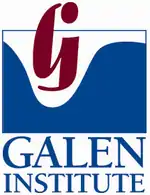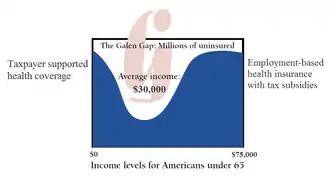Galen Institute
The Galen Institute is a non-profit public policy research organization based in Alexandria, Virginia. Founded in 1995 by Grace-Marie Turner, the Galen Institute's stated mission is "advancing free-market ideas in health policy, promoting a more informed public debate over ideas that support innovation, individual freedom, consumer choice, and competition in the health sector".[2] The Institute's funding has primarily come from individual, foundation, and corporate contributions and grants.[3]
 | |
| Formation | 1995 |
|---|---|
| Type | Public policy think tank |
| Location | |
President | Grace-Marie Turner |
Revenue (2017) | $900,771[1] |
| Expenses (2017) | $765,382[1] |
| Website | www |
History and principles
Founding and early activities
The Galen Institute was founded by Grace-Marie Turner in 1995[4] as a response to attempts to reform the United States's health care system in 1993.[5] Their first conference was held a year later, in 1996 on Capitol Hill in Washington D.C., and was titled A Fresh Approach to Health Care Reform. The papers presented at the conference were later published into a peer-reviewed volume, titled Empowering Health Care Consumers through Tax Reform. While this opposition was the initial focus of the organization, by the late 1990s Galen focused less on critiquing specific health reform initiatives, and more on advocating against the increasing role of the federal government in the American health sector,[6] proposing changes to existing government proposals,[7] and working to inform the public about the health reform debate.[8]
The Galen Institute receives its funding from donations and grants from corporations, foundations, and individuals both inside and outside the pharmaceutical and medical industries.[9]
Name and logo

The Galen Institute is named after Galen, the second century Greek physician who, along with Hippocrates, was one of the first and most influential health figures in the ancient world.
The Galen Institute's logo is also symbolic, representing what the Galen Institute describes as a fundamental problem in the American health sector: a lack of coverage among the middle class. The blue graph in the logo shows the number of Americans who have health insurance coverage; the poorest Americans (on the left side of the graph) are covered through government subsidies and programs such as Medicaid and SCHIP. The wealthiest Americans (on the right side of the graph) are covered through their employers. The group making an average of $30,000 in annual income (the gap in the middle) makes too much to qualify for federal assistance, but too little to have employer-based insurance.[10]
Mission
According to the mission statement on their website, the Galen Institute's core beliefs are that: "Consumers and their physicians should have authority and responsibility over health care decisions, and the vibrant free market will encourage research and innovation and provide better access to new medical technologies." "A market that supports innovation will lead to lower costs, expanded choice, and increased access to better medical care."[11]
The Galen Institute also states that their key goals are to: "Educate policymakers about the dangers that government control over the health sector pose to our economy and our society." To "reach out through the media to educate the public about the crucial importance of continued innovation to advance medical progress, and to attract new audiences to our message through the use of their newsletter, websites, and a variety of media tools."[11]
Health Policy Consensus group
The Health Policy Consensus Group, formed in 1993, is an affiliation of health policy experts from various market-based think tanks coordinated and facilitated by the Galen Institute. The Consensus Group began with a focus on increasing public awareness regarding the role of taxes on employment-based health insurance and how these taxes impact the health care system in the United States.[12] Today, the Consensus Group works to promote free-market health solutions through consumer driven reforms,[13] and provides "guidelines for a more efficient and equitable system to help the uninsured" to policy makers and lawmakers.[14]
Health Reform Hub
In October 2009, the Galen Institute launched the,[15] a website that provides a portal to resources concerning free-market health care reform. Including critical analysis from industry leaders and assessments of reforms being considered in Washington D.C. and around the country.[16] The Hub features a daily collection of the latest news articles, commentaries, video clips, radio interviews, and infographics from members of the Galen Institute and opinion leaders in the health sector.
Selected studies and publications
- Arnett, Grace-Marie. Empowering Health Care Consumers through Tax Reform. New York: University of Michigan, 1999.
- "Competition in the Health Care Marketplace: Testimony before the U.S. Senate Committee on Commerce, Science, and Transportation." Grace-Marie Turner. July 16, 2009.
- "Massachusetts’ Health Reform Plan: Miracle or Muddle?" Grace-Marie Turner and Tara Persico. June 26, 2009.
- "Providing Coverage For All Through Private Health Insurance." Grace-Marie Turner. May 18, 2009.
References
- "Galen Institute" (PDF). Candid. Retrieved November 27, 2019.
- "Galen Institute – Mission Statement". Galen.org. January 6, 2012. Retrieved January 13, 2012.
- "Galen Institute" (PDF). Foundationcenter. Retrieved November 27, 2019.
- "Grace-Marie Turner". The Small Business Advocate. Retrieved November 27, 2019.
- Arnett, Grace-Marie (1999). Empowering Health Care Consumers Through Tax Reform. University of Michigan Press. ISBN 0472067168.
- Kerrigan, Karen (December 21, 1998). "Health reform effort's intent is lost in cost increases". Biz Journal. Retrieved November 27, 2019.
- Bailey, Ronald. "Mandatory Universal Health Insurance?" Reason Magazine, August 6, 2003
- Filed As: Health Care (January 8, 2008). ""The Basics of Health Policy." State Policy Network, January 8, 2008". Blog.spn.org. Archived from the original on October 3, 2011. Retrieved January 13, 2012.
- Grace-Marie Turner (November 9, 2009). "AARP's tacit endorsement of Medicare cuts line its pockets, but shortchanges seniors". Janesville Gazette. Retrieved July 10, 2010.
- "Who was Galen?". Galen Institute. Archived from the original on April 26, 2009. Retrieved November 27, 2019.
- Galen Institute (October 26, 2011). "Mission and History". Archived from the original on May 17, 2015. Retrieved May 27, 2015.
- "About The Health Policy Consensus Group." The Heartland Institute, April 1, 2001.
- ""Conservative Alliance Outlines 6 Deal-Killers For National Health Reform." Reuters, April 1, 2009". Reuters. April 1, 2009. Retrieved January 13, 2012.
- "Health Policy Consensus Group | Galen Institute". Galen.org. December 20, 2011. Retrieved January 13, 2012.
- "The importance of learning new skills for your health". Health Reform Hub. Retrieved November 27, 2019.
- Health Reform Hub – About Us